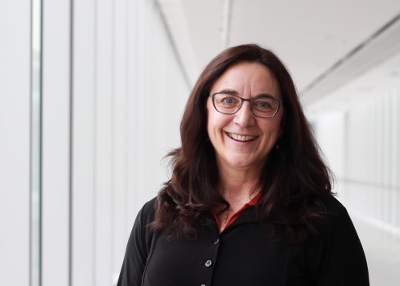
Louanne Keenan is the Faculty of Medicine & Dentistry's Director of Community Engaged Research and the recipient of a 2018 Equity, Diversity and Inclusion Award.
Louanne Keenan's career has taken many twists and turns. From teaching local dental hygiene students to navigating the muddy terrain of a riverside community in Nicaragua, she aims to help people improve their quality of life on their own terms.
Keenan trained in dental hygiene as the first step in her multifaceted career, followed by a bachelor's degree in economics and articling with the accounting firm Coopers and Lybrand. Her love of teaching and humanitarian principles led her to complete a master's degree in adult education, followed by a PhD in human ecology and population health. Her unconventional academic background allows her to work in a variety of health-care fields to better understand the needs of diverse populations.
Keenan, the Faculty of Medicine & Dentistry's Director of Community Engaged Research, is the recipient of a 2018 Equity, Diversity and Inclusion Award. The award recognizes members of the U of A who support the university's mission to "value diversity, inclusivity, and equity across and among our people, campuses, and disciplines."
Keenan says she was especially proud when she learned that she was nominated by her students. "My philosophy is that we're here to serve the students and the community. So if that's who nominated me, then I feel truly honoured."
What is community-engaged research?
Community-engaged research gives voice to participants by including them at each step of the investigation, including data collection, analysis and dissemination This can be time-consuming, Keenan says, but allows a population to identify and meet their own needs, instead of having them prescribed.
"Students often think 'community' means 'interdisciplinary' but community-based research is literally being in the community―going to the prison and working with the female inmates, going to the multicultural health brokers and sharing alongside the low-income immigrant seniors. Not only are they part of that data, their voices are in the research and they get to analyze it, and own it."
Though the process can be a challenge, community-based research work can reveal valuable insights about infrastructure, religious beliefs and social circumstances that can influence, hinder or support the delivery of health care.
"If you go across the river, or if you go into the prison, there's a whole new culture. You go to the needle exchange program, or the Bissell Center, or the Mustard Seed, these are different worlds with different people who have different ways of sharing their knowledge and values. And I am different too, and I have to listen to earn their trust and friendship."
Globetrotting for micro-changes
Keenan's career has allowed her to work alongside people in Ethiopia, Rwanda, Uganda, Nepal, the Philippines, China, Central and South America, as well as locally in Alberta correctional facilities and with numerous Edmonton-based non-profit partners. Her key lessons, she says, are the importance of listening, not to underestimate people and to learn from misunderstandings.
"It is always about the patients," Keenan said. "When I go to developing countries and work or volunteer there, mostly I'm watching and thinking, 'please let me do something good and not do any harm'."
Sometimes unintentional mistakes can have major consequences, Keenan says, so it's important to listen. "You must go in with their agenda, not yours. That's the biggest thing."
Modelling empathy in medical school
Qualities like empathy and compassion are crucial skills for all health professions, and when it comes to teaching medical students, Keenan says these skills must not be tokenistic. "I think it's modeled, and that means faculty development."
"They say people who have experienced cancer start to recognize other people with cancer. Before having cancer, you can sort of feel sorry for them, but when you get cancer, you phone up your friend and say 'I'm sorry. I had no idea it was this hard. I had no idea'. Empathy grows with experience and so does the wisdom to see the value of living through adversity."